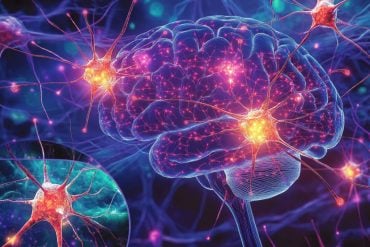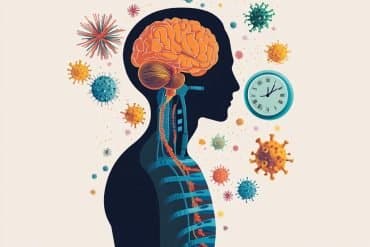Summary: The biological changes that occur as a result of aging could be a mechanism behind why older adults with depression do not have a full resolution of symptoms following taking antidepressants.
Source: UConn
Major depression in older adults is very common, disabling, and increases the risk of many diseases of aging, including Alzheimer’s disease and other dementias, cardiovascular issues and even mortality. Therefore, it constitutes a major public health issue, especially considering the growing number of older adults in the U.S. and worldwide.
Many older adults with depression do not experience full resolution of their depressive symptoms with antidepressant treatment.
Improving or achieving full resolution of depression in older adults is a major clinical challenge, and approximately 50% of patients experience persistent depressive symptoms after antidepressant treatment.
The persistence of depressive symptoms becomes a source of depleted psychological well-being, increased disability, accelerated cognitive decline, and premature aging in older adults.
Therefore, identifying the mechanisms and factors associated with treatment outcomes in this population is key for improving therapeutics and identifying those individuals for whom antidepressant treatment would be more effective.
Dr. Breno Diniz, associate professor of psychiatry at the UConn Center on Aging at UConn Health and his colleagues addressed these issues in a study published on June 30, 2022 in JAMA Network Open.
They used a recently developed composite biomarker index associated with cellular and molecular senescence [the senescence-associated secretory phenotype, SASP] to test the hypothesis that biological changes that occur with aging are one of the mechanisms of poor treatment outcomes in older adults with depression.
They found that higher SASP index scores were significantly associated with a lower likelihood of full resolution of the depressive symptoms after antidepressant treatment.

These findings are important because they highlight the importance of age-related biological abnormalities, reflected in the SASP index, as a potential mechanism related to treatment resistance to antidepressants in older adults.
This investigation opens up new possibilities to investigate alternative interventions to improve the odds of responding to antidepressant treatment in this population, for example, by testing whether senolytic drugs can improve rates of treatment remission in older adults with depression.
Also, the measurement of the SASP index biomarkers can help to identify those individuals in which treatment would be futile at the treatment outset.
These findings can inform a path forward for geroscience-guided interventions targeting senescence to improve depressive symptoms older adults.
About this aging and depression research news
Author: Press Office
Source: UConn
Contact: Press Office – UConn
Image: The image is in the public domain
Original Research: Open access.
“Association of Molecular Senescence Markers in Late-Life Depression With Clinical Characteristics and Treatment Outcome” by Breno S. Diniz et al. JAMA Network Open
Abstract
Association of Molecular Senescence Markers in Late-Life Depression With Clinical Characteristics and Treatment Outcome
Importance
Many older adults with depression do not experience remission with antidepressant treatment, and markers of cellular senescence in late-life depression (LLD) are associated with greater severity of depression, greater executive dysfunction, and higher medical illness burden. Since these clinical characteristics are associated with remission in LLD, molecular and cellular senescence abnormalities could be a possible biological mechanism underlying poor treatment response in this population.
Objective
To examine whether the senescence-associated secretory phenotype (SASP) index was associated with the likelihood of remission from a depressive episode in older adults.
Design, Setting, and Participants
A nonrandomized, open-label clinical trial was conducted between August 2009 and August 2014 in Pittsburgh, Pennsylvania; St Louis, Missouri; and Toronto, Ontario, Canada, with older adults in a current major depressive episode according to the Diagnostic and Statistical Manual of Mental Disorders (Fourth Edition, Text Revision) diagnostic criteria. Data from biomarker analyses were reported according to the clinical trial archived plasma samples run in March 2021. Data were analyzed from June to November 2021.
Exposure
Venlafaxine extended release (dose ranging from 37.5 mg to 300 mg daily) for up to 12 weeks.
Main Outcomes and Measures
The association between a composite biomarker-based index (SASP index) and treatment remission in older adults with major depression was measured using clinical data and blood samples.
Results
There were 416 participants with a mean (SD) age of 60.02 (7.13) years; 64% (265 participants) were self-reported female, and the mean (SD) Montgomery-Asberg Depression Rating Scale score was 26.6 (5.7). Higher SASP index scores were independently associated with higher rates of nonremission, with an increase of 1 unit in the SASP index score increasing the odds of nonremission by 19% (adjusted odds ratio, 1.19; 95% CI, 1.05-1.35; P = .006). In contrast, no individual SASP factors were associated with remission in LLD.
Conclusions and Relevance
Using clinical data and blood samples from a nonrandomized clinical trial, the results of this study suggest that molecular and cellular senescence, as measured with the SASP index, is associated with worse treatment outcomes in LLD. Combining this index score reflecting interrelated biological processes with other molecular, clinical, and neuroimaging markers may be useful in evaluating antidepressant treatment outcomes. These findings inform a path forward for geroscience-guided interventions targeting senescence to improve remission rates in LLD.
Trial Registration
ClinicalTrials.gov Identifier: NCT00892047






